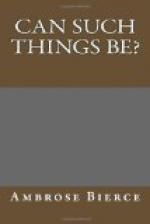Moxon was silent for a long time, gazing absently into the fire. It was growing late and I thought it time to be going, but somehow I did not like the notion of leaving him in that isolated house, all alone except for the presence of some person of whose nature my conjectures could go no further than that it was unfriendly, perhaps malign. Leaning toward him and looking earnestly into his eyes while making a motion with my hand through the door of his workshop, I said:
“Moxon, whom have you in there?”
Somewhat to my surprise he laughed lightly and answered without hesitation:
“Nobody; the incident that you have in mind was caused by my folly in leaving a machine in action with nothing to act upon, while I undertook the interminable task of enlightening your understanding. Do you happen to know that Consciousness is the creature of Rhythm?”
“O bother them both!” I replied, rising and laying hold of my overcoat. “I’m going to wish you good night; and I’ll add the hope that the machine which you inadvertently left in action will have her gloves on the next time you think it needful to stop her.”
Without waiting to observe the effect of my shot I left the house.
Rain was falling, and the darkness was intense. In the sky beyond the crest of a hill toward which I groped my way along precarious plank sidewalks and across miry, unpaved streets I could see the faint glow of the city’s lights, but behind me nothing was visible but a single window of Moxon’s house. It glowed with what seemed to me a mysterious and fateful meaning. I knew it was an uncurtained aperture in my friend’s “machine-shop,” and I had little doubt that he had resumed the studies interrupted by his duties as my instructor in mechanical consciousness and the fatherhood of Rhythm. Odd, and in some degree humorous, as his convictions seemed to me at that time, I could not wholly divest myself of the feeling that they had some tragic relation to his life and character—perhaps to his destiny—although I no longer entertained the notion that they were the vagaries of a disordered mind. Whatever might be thought of his views, his exposition of them was too logical for that. Over and over, his last words came back to me: “Consciousness is the creature of Rhythm.” Bald and terse as the statement was, I now found it infinitely alluring. At each recurrence it broadened in meaning and deepened in suggestion. Why, here, (I thought) is something upon which to found a philosophy. If consciousness is the product of rhythm all things are conscious, for all have motion, and all motion is rhythmic. I wondered if Moxon knew the significance and breadth of his thought—the scope of this momentous generalization; or had he arrived at his philosophic faith by the tortuous and uncertain road of observation?




